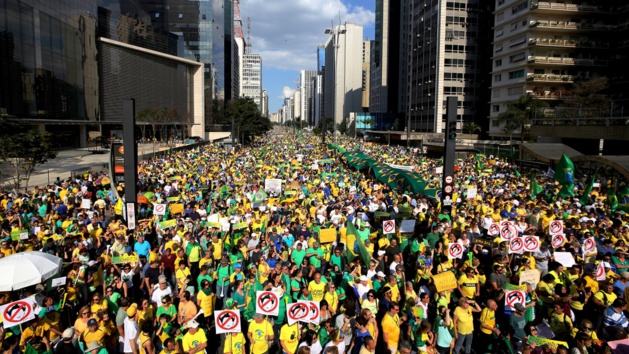
Credits RR
Saturday 27th of June, defeated by Paraguay during the penalties, Brazil iswas eliminated from the Copa America, the south-American equivalent of the UEFA Euro tournament. It is another disappointment in a country already under the grip of a serious social crisis, and of which even the national football team, which represented the pride of the country, is not so dreamy anymore. This same team was in the midst of a scandal between 2013 and 2014, when protest movements regarding the expenses for the World Cup broke out.
According to a large part of the population, and in spite of their special relationship with this sport, this money is misused and the public funds are wasted by being destined to the construction of huge stadiums instead of investment in new infrastructures, and economical and social reforms deemed vital. The massive mediatisation of the event had allowed this situation to be broadcasted outside of Brazilian borders. With the frenzy over, and in spite of the removal of international TV cameras, the general mood of the population is still one of disappointment and dissatisfaction.
Austerity and protests in the centre of the political agenda
The 29th of January 2015, the subway of Sao Paulo was the home of violent fights between young Brazilians and the police forces. The rioters were protesting against a new increase of transport prices: 3,5 reals instead of the usual 3, approximately € 1.15 for a bus ticket. The goal was to remind Brazilian authorities that the people are still firmly waiting for new reforms. The commuting transports sector, lashing point of the protesters in 2013 and trigger point of the important social crisis in brazil is the last straw for the people, as shows the headline who brought so many Brazilians in the streets: « Não é só pelleos 20 centavos » meaning " It’s not just the 20 cents ".
Today, the population is still waiting for the modernization promised by the government. « Brazilians are angry, because despite of promises to improve infrastructures, mainly in the transports sector, during the candidacy of Brazil, nothing has really changed today and the stadiums built for the World Cup are of no use to Brazil » explains Bruno, a Brazilian student who is now living in the united states, who illustrates this waste with the example of the Amazonia Arena, brand new Manaus stadium that has been left unused.
Everywhere in the country and for two years now, the population is has been asking for deep social reforms. First in the transports sector, but also in the health sector and in education, judged unequal and reserved to the upper class of the population. The development of these public services did not follow the rapid growth of the country and they now seem out-dated. Last April, and in spite of a general lull protests, riots erupted all across the country. Teachers had mobilized themselves following the first parliamentary debates dedicated to the study of an educational reform project that the teaching staff judged unsatisfying.
This modernization of the public services seems all the more delicate when Brazil needs to deal with economic problems and an austerity policy, the answer of the government in front of the strong recession which marked 2014. These austerity measures, due to a lack of agreement between the majorities, have not had the effects expected.
An intricate situation for Dilma Roussef
Already weakened by a tense socio-economical climate, the Brazilian political power has sunk under a large financial scandal since the beginning of 2015. President Dilma Roussef, leader of the labour party, who is in her second mandate since her difficult re-election in the autumn of 2014, is in a critical situation, after her named appeared in the Petrobras case. This corruption scandal has touched fifty Brazilian political leaders, accused of having received almost 4 billion of dollars in bribes from the oil tanker Petrobras over fifteen years. These sums were destined to secure the acquisition of promising public contracts. Indirectly touched by this scandal, and in spite of the lack of proof to incriminate her, Dilma Roussef is at the lowest in the polls.
She used to sit on the administrative board of Petrobras, first company of the country, and now only has an 8% approval rate. Worse, according to her opponents from the centre party, she could be forced to resign. Two thirds of the Brazilians would be in favour of an anticipated change of president, “ especially in the south, where the population, richer and more educated, are asking for the impeachment written in the Brazilian constitution” according to Bruno. Sunday 16th of August, approximately 500 000 Brazilians were once again in the streets to ask for her resignation.
Leader of the labour party, in power since 2002 aiming to reduce inequalities, Dilma Roussef will have a lot to do in these next months with a big challenge, hosting another worldwide event, the Olympic Games of Rio 2016, and its organisation is for now going quite smoothly. Nevertheless, Bruno, a Rio native, explains that « many cariocas are doubting of the rightful utilization of the budget allocated to the organisation and fear, once again, costs with no real interest for the population ». These Olympic games will, without a doubt, and with all the risks linked to it, put Brazil back in the spotlight in 2016.




























